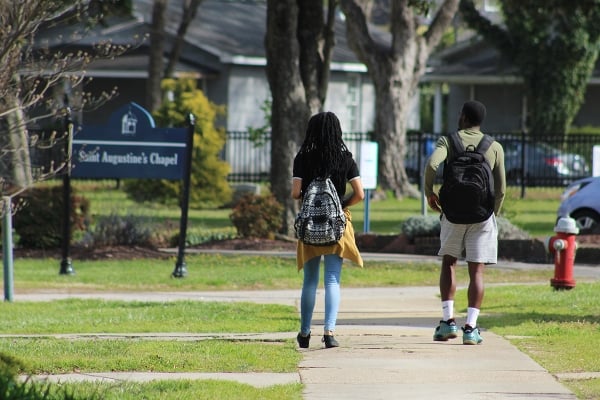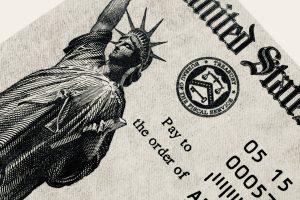Approaching a critical vote on its accreditation status next month, Saint Augustine’s University has made controversial moves in recent months to stabilize its shaky financial position, but so far none have paid off, putting the beleaguered institution in a more precarious position.
First, the historically Black university in North Carolina took out a $7 million loan last fall that many critics have described as predatory given its 24 percent interest rate and 2 percent management fee. The university also put real estate up as collateral in case of a loan default.
Then, in November, SAU officials also struck a $70 million deal with 50 Plus 1 Sports, a fledgling Florida company, to lease its campus and develop university property for 99 years. The deal would have provided a much-needed financial lifeline for the cash-strapped university that needs to urgently fix its finances before the accreditation review. (The college was previously stripped of accreditation due to university financial and governance issues but appealed.)
But that lifeline is in legal limbo after the North Carolina attorney general rejected the deal Monday.
The North Carolina attorney general’s office, which reviewed the deal due to state law on the transfer of assets from a nonprofit, announced it would not approve the arrangement with 50 Plus 1 Sports as written due to a lack of “sufficient documentation to support the proposal” and concerns that the payout “is too low to justify transfer of the lease rights” for SAU’s campus, which is appraised at $198 million. The attorney general’s Office also expressed concerns about SAU’s “ability to continue to operate.”
Ongoing Financial Struggles
Saint Augustine’s has faced rising pressures since December 2023 when it fired then-president Christine McPhail, who subsequently lodged a gender-based discrimination complaint against the board. That same week the Southern Association of Colleges and Schools Commission on Colleges announced it had voted to strip SAU’s accreditation due to board and finance issues.
(SAU lost an appeal to that decision but won a reprieve in court in July before SACSCOC voted again in December to strip accreditation. The accreditor will vote on SAU’s appeal next month.)
Since early 2024—under the guidance of interim president Marcus Burgess—SAU has navigated a series of challenges in a bid to stay afloat. In February, it was hit with a $7.9 million tax lien. That same month, local officials encouraged SAU to explore a merger with nearby Shaw University, another HBCU. Months later, SAU board chair Brian Boulware cast the proposal as an aggressive effort to ramrod a partnership. (Local officials have denied his account.) In May, a group called the Save SAU Coalition sued Boulware and other trustees, alleging malfeasance and self-dealing by the board.
That case was later dismissed due to a lack of standing.
Enrollment has also plummeted, falling from more than 1,100 students in fall 2022 to a head count of around 200 students last fall, according to recent estimates. SAU has also announced major staff reductions.
As its financial pressures added up, Saint Augustine’s borrowed $7 million from Gothic Ventures, an investment firm, and secured a $30 million line of credit. The deal, which came with a 24 percent interest rate and a 2 percent loan management fee, sparked alumni protests in the fall.
Mark DeFusco, a senior consultant with Higher Education Consolidation Solutions and sector finance expert, told Inside Higher Ed the terms of the Gothic Ventures loan were “crazy” and “irresponsible.” DeFusco agreed with the description of the loan as “predatory.”
SAU officials have defended the agreement, writing that the deal is “crucial for maintaining educational services” and securing the loan contradicted “claims of irresponsibility in financial dealings” leveled by critics. SAU has cast criticism of the deal as a “smear campaign.”
Earlier this month, two local publications, INDY Week and The Assembly, reported that last fall SAU turned down a more favorable loan offer of $19.5 million with a 9 percent interest rate. That offer, from Self-Help Credit Union, stipulated that two board members, including Boulware, resign, and would have included purchasing the existing Gothic Ventures loan. The university balked at the attached conditions.
To DeFusco, the board resignations as part of the loan conditions were a reasonable request.
“There are provisions in leadership for all kinds of lending. And with all due respect, it was a wise provision, because you have a board that’s allowed [financial issues] to go on for several years now. This isn’t something new,” DeFusco said. “They haven’t broken even for at least five years from what I could see in their records, and their accrediting body was going to close them down, except for that arbitration. And now they’re about to close them down again.”
Continued financial struggles ultimately led SAU to a deal with 50 Plus 1 Sports, which describes itself on its website as a financing and development firm. That agreement, according to a university statement, would “generate a $70 million upfront investment” from the company.
But the North Carolina attorney general’s office shut down that proposed deal.
Beyond the lack of documentation on the proposal and the low payout, Assistant Attorney General Kunal Choksi also raised questions about the university’s due diligence of the deal.
“SAU’s board and trustees were obligated to perform due diligence on whether 50+ can meet its obligations under the transaction and has the experience to develop revenue-generating property on the leased land,” Choksi wrote in a letter shared with Inside Higher Ed.
Choksi added that the attorney general’s office had requested “sufficient proof that 50+ has the financial ability to comply with its obligations to SAU and avoid default with its financiers” and “details about similar deals 50+ has developed, including deals with other universities, or the company’s audited financial statements.” Choksi indicated in his letter that SAU had not yet provided those details on the proposal.
In a Tuesday statement, SAU officials said little about the concerns raised by the attorney general about the 50 Plus 1 Sports deal or its ability to operate. Instead, university officials took aim at Self-Help Credit Union.
SAU noted concerns “about the process that led to the recent rejection” of the agreement. Specifically, they pointed to a meeting between Marin Eakes of Self-Help Credit Union and alleged that the attorney general’s letter reflected comments made by Eakes in unspecified media coverage and alleged the 50 Plus 1 Sports proposal was shared without SAU’s consent.
SAU officials wrote in the statement that they “suspect that the Attorney General’s Office used Mr. Eakes’ counsel and input to subsequently influence their decision. Such interference by Self-Help raises significant concerns about fairness. It suggests their attempt to weaponize the NC Attorney General’s Office to obstruct the approval process for the 50 Plus 1 Sports deal.”
An Unknown Partner
With the North Carolina attorney general’s office shutting down the 50 Plus 1 deal, SAU has little time to fix its finances ahead of a looming vote on its accreditation status in late February.
And questions about both the deal and the company linger.
Information on 50 Plus 1 Sports is sparse and it is unclear, as noted by the attorney general’s office, whether the nascent company has the resources to back the deal. Little is known about 50 Plus 1 Sports, which unsuccessfully big on a $800 million stadium development deal in St. Petersburg, Fla., in early 2023. The firm was not selected for the project amid questions from local officials about how it would finance the deal and a lack of experience as a lead developer.
In its St. Petersburg proposal, 50 Plus Sports listed a $1.4 billion deal to develop a sports and entertainment district for the University of New Orleans among its reference projects. However, a UNO spokesperson told Inside Higher Ed by email it is not “moving forward with the project.”
Monti Valrie, founder and CEO of 50 Plus 1 Sports, did not respond to a request for comment.
What’s Next for SAU?
The attorney general’s office did leave the door open to reconsider the deal. But the university would have to provide more details to the office, including evidence that SAU conducted due diligence on 50 Plus 1 Sports and its finances.
SAU officials noted in their statement that “despite these challenges, SAU remains committed to working collaboratively with the Attorney General’s Office. We believe transparency and open dialogue are essential in securing the funding for our university’s sustainability and growth.”
But SAU is facing a ticking clock to get that information to the attorney general or rework the deal. University officials have said that the deal needed to close by Jan. 31. Otherwise, “SAU risks failing to demonstrate financial sustainability” before its appeal hearing next month, according to a university statement.
But DeFusco wonders if SAU’s finances are too far gone to fix.
“Their finances are so bad they may be criminal,” he said, pointing to payroll and tax issues. (The university also allegedly failed to maintain worker’s compensation for employees recently.)
As pressure mounts, DeFusco believes the board needs more scrutiny for SAU’s financial problems, arguing “they missed it for years” as the university slipped deeper into the red.
“Now the question is, is the board acting as a fiduciary?” DeFusco said.








